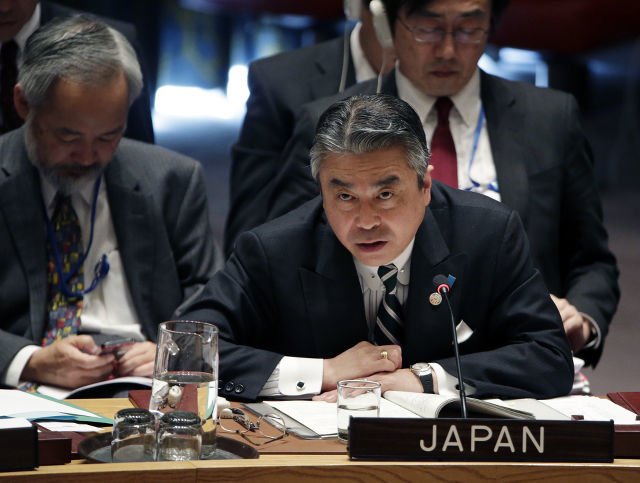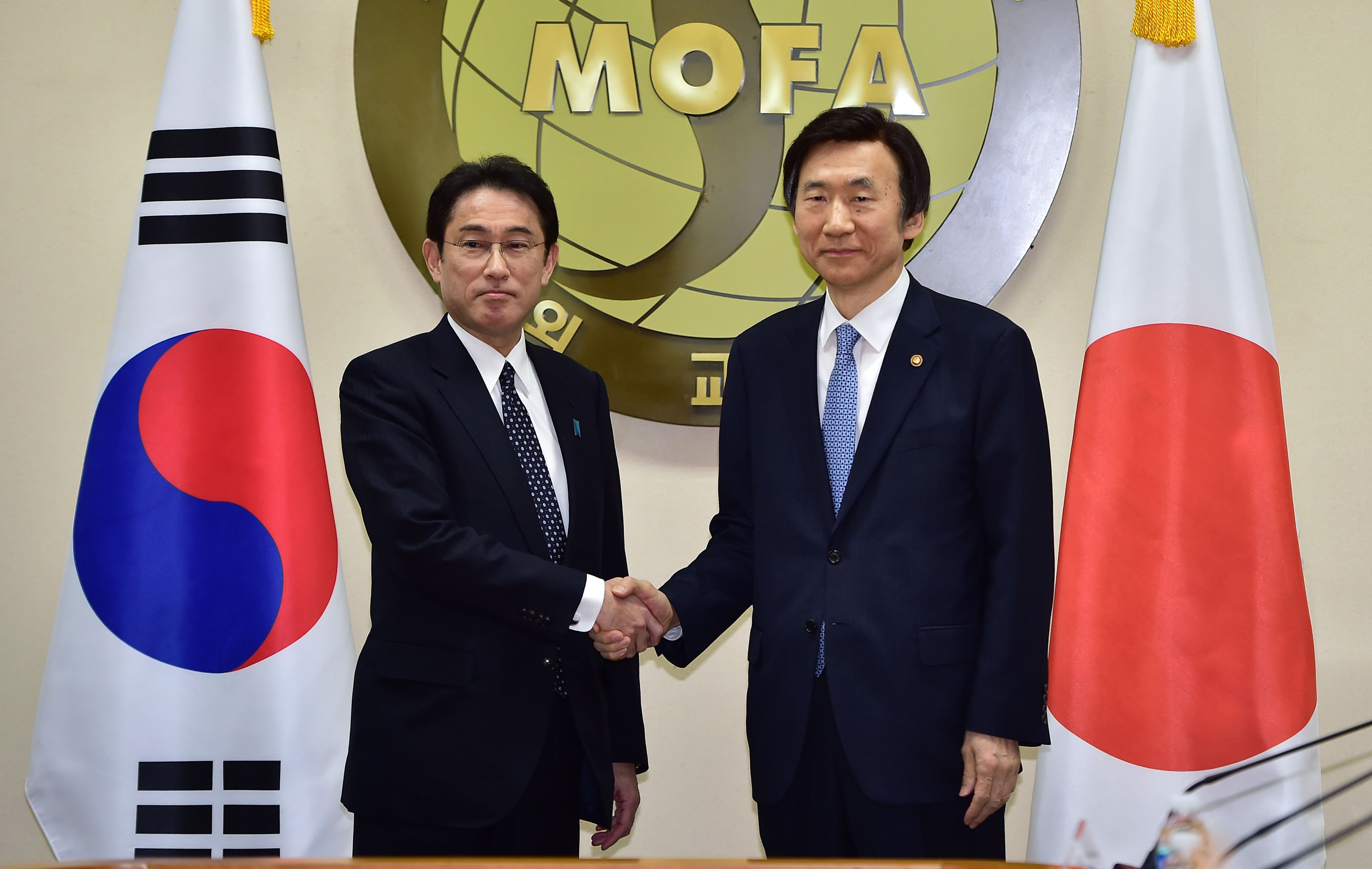|
|
Post by Admin on Aug 6, 2016 18:31:05 GMT
 Japan will provide $9.5 million to a fund compensating Korean "comfort women" of World War II, Seoul's Foreign Ministry announced Wednesday. The August deposit to the Reconciliation and Healing foundation is meant to resolve a long-running diplomatic feud between the two countries. The mission of the foundation, scheduled to begin operations Thursday, is to restore dignity to up to 200,000 women, euphemistically called "comfort women," enslaved in brothels serving Japanese soldiers, while the Korean peninsula was under Japanese rule from 1910 to 1945.  A matter remaining unsettled is a bronze statue honoring those enslaved, near the Japanese embassy in Seoul. Depicting a woman seated in a chair, its removal had been part of Japanese diplomatic demands, but was not mentioned in the December agreement. The South Korean government, noting it was commissioned and installed by Seoul civic groups, has said it has no plans to remove the statue. |
|
|
|
Post by Admin on Aug 9, 2016 18:46:45 GMT
 The local Korean community and a Sydney charity are being pressured not to display the 1.5-metre statue from Korea, which was due to be unveiled this week in Sydney's inner west. Reverend Crews said he met with Minister for Multiculturalism John Ajaka and the Japanese Consul-General last week. "And basically their concern was three words: 'Japanese' and 'comfort women' … they were very concerned about community conflict," he said.  Reverend Crews said the statue could be erected on church grounds if Canterbury-Bankstown Council did not install the sculpture on council land. "In this place we don't accept violence against people, we don't accept people being abused, we don't accept people being sexually exploited," he said. "Those sorts of things are always wrong, no excuses, and a statue like this going up says 'this is wrong'." The ABC has obtained a copy of a letter from the lawyers for the Australia-Japan Community Network sent to the Canterbury-Bankstown Council in late June. The letter states that the statue would be in breach of section 18C(1)(a) of the Commonwealth's Racial Discrimination Act as it would be "reasonably likely, in all the circumstances, to offend, insult, humiliate or intimidate another person or a group of people".  In a letter sent to Mr Crews in June, network president Tesshu Yamaoka said the statue was being pushed by political activists "connected to north Korea". "These Korean anti-Japan activities are being utilized as a part of the Chinese Communist Party's information operation attempting to cut the ties of the alliance between Japan, the US and Australia," he wrote. |
|
|
|
Post by Admin on Sept 10, 2016 18:30:20 GMT
 Japan's foreign ministry was found to have posted a high-ranking official's comments on its English website Saturday that denies forceful mobilization of comfort women by its military and government authorities during World War II.  The posting dated on Aug. 9 was a summary of comments by Shinsuke Sugiyama, Japan's deputy foreign minister, during a United Nations committee meeting held in Geneva back in February. The summarized remarks were first posted on the ministry's official website in March and its translated version was posted on its English site as well.  Sugiyama was quoted as saying that Japan started a fact-finding work in the early 1990s about comfort women, but it could not be confirmed that there was any "forceful taking away of comfort women by the military and government authorities."  He went on saying that the concept of forceful mobilization is based on what he claimed were fabricated facts carried in a book titled "My war crimes" written by Seiji Yoshida, in which the author said that a lot of women on the southern island of Jeju were taken away by the military. |
|
|
|
Post by Admin on Sept 14, 2016 18:27:09 GMT
On December 28, 2015, Japanese Foreign Minister Fumio Kishida and South Korean Foreign Minister Yun Byung-se announced that both sides had reached a “final and irreversible” deal on the comfort women issue. Since their agreement, both Japan and South Korea have proceeded to implement the deal. On July 28, 2016, South Korean government officially established the Foundation for Reconciliation and Healing, a non-governmental organization that aims to assist surviving comfort women and relatives of deceased comfort women. Japan, after a cabinet meeting on August 25, provided the promised 10 billion yen (roughly $9 million) to the Foundation for Reconciliation and Healing. South Korea’s Ministry of Foreign Affairs has also promised to disburse twenty million won (roughly $18,000) and one hundred million won (roughly $90,000) to the families of deceased comfort women and surviving comfort women, respectively.  Despite the skepticism and growing opposition toward the comfort women deal, South Korea is unlikely to renegotiate or abandon the deal. To reiterate the words of Japanese and South Korean foreign ministers, the deal is “final and irreversible.” Should South Korea decide to abandon the deal, such action would seriously harm South Korea’s credibility with Japan and its future diplomatic conduct with other nations. More important, South Korea’s withdrawal from the deal would not only damage its relations with Japan but also its alliance with the United States, which has long been frustrated over tensions between its two major allies in the Asia-Pacific. The comfort women deal is no longer just a diplomatic issue between South Korea and Japan, but primarily a sensitive domestic issue within South Korea on how to implement the deal. The main task for Park is not to defy the opposition but instead to integrate them into the implementation process. The Park administration will need to persuade the surviving comfort women and relatives of deceased comfort women, the civil society groups, and the opposition parties to participate in the implementation process. This will be a daunting task, but unless the Park administration can bridge the perception gap between the government and its people, the comfort women agreement will only sow the seeds of discord within Korea and add to further impasse in Korea-Japan relations in the days to come.  The comfort women deal has been largely heralded by numerous experts as an example of successful diplomacy, but its success actually depends on how Park can reconcile disagreements within Korean society and effectively implement the deal. Only then will the comfort women deal become a new starting point to reconcile historical legacies in South Korea-Japan relations and chart a path toward future-oriented bilateral relations. |
|
|
|
Post by Admin on Sept 26, 2016 18:34:03 GMT
 The German city of Freiburg has decided not to proceed with a plan to erect a statue of a girl symbolizing so-called “comfort women” who were procured for Japan’s wartime military brothels, after encountering strong opposition from its Japanese sister-city Matsuyama, a city spokesperson said. Freiburg had accepted a proposal from its South Korean sister-city Suwon for the statue, a replica of one erected in December 2011 in front of the Japanese Embassy in central Seoul, to be sent there as a gift and erected in a downtown park. The spokesperson said the decision to drop the plan has been conveyed to Suwon, adding that the city never had any intention of hurting the feelings of the Japanese people.  Civil groups in Suwon, the capital of Gyeonggi province which surrounds Seoul, had been working to raise 60 million won (approximately ¥5.5 million) for the project, which one member complained “was blocked by the Japanese government and right-wingers.”  A Suwon municipal official earlier said that Mayor Yeom Tae-young was told by the mayor of the city in southwestern Germany, Dieter Salomon, that officials from Matsuyama strongly objected to the idea. |
|